Paul Carson had planned to have a fun night with his family at TIFF.
He took his daughters and wife to the festival so they could see the celebrities. Instead, they got a jerk shouting the infamous “FHRINP” (only this time it was FHRITA, because FHRITP was too classy for him).
His fifteen-year-old daughter was stopped outside of the Princess of Wales Theatre by a Japanese film crew. They asked her a few questions about what celebrities she wanted to see when a man swooped in, said those disgusting words, and ran off “hooting and hollering, like he just scored a touchdown.”
Unfortunately, this isn’t anywhere near the first time this has happened. FHRITP—short for “f*** her right in the p****”—was first popularized by a series of videos in 2014 that were later revealed to be a hoax, but, as ten-year-old-boy-funny things tend to, it became an internet meme. Now, idiots all over the world are videobombing reporters with the phrase. In September 2014, Florida State quarterback Jameis Winston was suspended for half a game (a whole half a game, guys, wow!) for standing on a table in the student union and shouting it. Four months ago, Shawn Simoes, a Hydro One employee who made over $106,000 (CAD) in 2014, was fired from his job for heckling City TV reporter Shauna Hunt and then trying to defend his actions. Shauna Hunt, bless her soul, went out after the men who shouted ‘FHRITP’ at her and asked them why they did it. Their response?
“Because I feel like it’s quite substantial.”
“It is f***ing hilarious.”
Etcetera.
You see the problem?
CBC News asked their reporters what their experiences with this phrase were. In Manitoba, at least eleven CBC Winnipeg reporters have had it shouted at them. Holly Caruk, a videographer, said, “this was something that felt very targeted to me as a woman and very threatening.” Toronto reporter Shannon Martin said that once when she was filming a segment outside a high school, half a dozen different groups shouted the phrase at her within a few minutes of her arrival. When she told the school and the school informed the students’ parents, she was told they were just “trying to get a laugh from their buddies.” Standing in large crowds where this phrase might be said to her can make her very uncomfortable.
And it’s not even just the FHRITP phenomenon. Women in media—reporters, journalist, videographers, bloggers, whatever—are met with misogyny at every end. They’re belittled, treated like second class and even threatened with rape and death online. Sex journalist Amanda Hess was tweeted rape and decapitation threats by someone who went by the username ‘femaleheadlesspig’. They said they lived in the same state as her and were going to look her up and find her. They ended the threat with “you are going to die and I am the one who is going to kill you. I promise you this.” Caroline Criando, who successfully campaigned for Jane Austen to be put on the ten-pound note, received about fifty abusive tweets an hour in the first twelve hours after the switch was announced, many of them rape and death threats. I could go on and on listing journalists who’ve gotten rape and death threats. Problem is, the list would never end.
This needs to stop.
Why are we doing this? Why is this happening? Why is the first thing that comes to mind when a women says something others don’t agree with “I want to rape you”? Why is it okay for men to have even the most controversial opinions when if a woman in media dares to do the same, she’s told to go die? Why, why, why?
Is it funny? Like FHRITP, is it just a joke? Do you laugh about it with your buddies over beers? Does it make you feel big and strong? As Lily Allen sings in her song F*** You, do you really enjoy living a life that’s so hateful? Does being an a-hole get your rocks off?
Here’s the thing: it might feel good. It might make you feel better to get that five seconds of fame that being obscene gets you. Maybe telling that journalist that you want to rape her makes the stress from your bad day go away.
But that reporter you shouted FHITP at, that journalist you threatened to rape because you didn’t like her article? It doesn’t make her feel good at all.
Have you ever thought about what it would be like to have that done to you? Have you ever thought that like Shannon Martin, it might make you uncomfortable, unsafe, even? Have you ever considered that the woman you’re saying those things to might have actually experienced sexual assault before?
Maybe this is a bit of a sensitive issue for me because journalism is one of the career paths that interests me. But reading this stuff, finding out that if I ever get successful I’m probably going to be told to die and get raped and not be allowed to feel safe, scares me. I love writing. It’s what I’m good at. Uncovering issues, getting people’s stories, learning things—that’s what I want to do. But this stuff doesn’t make me so sure anymore.
Sources:
- https://en.wikipedia.org/wiki/FHRITP
- http://www.cbc.ca/news/canada/toronto/teen-s-tiff-tv-interview-interrupted-by-man-s-vulgar-barb-1.3226347
- http://www.buzzfeed.com/ryanhatesthis/jameis-winston-suspended-half-a-game-fhritp#.ybdbXgEbn2
- http://globalnews.ca/news/1993793/mlse-willing-to-ban-anyone-yelling-fhritp-near-facilities/
- http://www.cbc.ca/news/canada/fhritp-phenomenon-cbc-journalists-share-mortifying-experiences-1.3072191
- http://www.psmag.com/health-and-behavior/women-arent-welcome-internet-72170
- http://www.telegraph.co.uk/technology/10207231/Woman-who-campaigned-for-Jane-Austen-bank-note-receives-Twitter-death-threats.html


